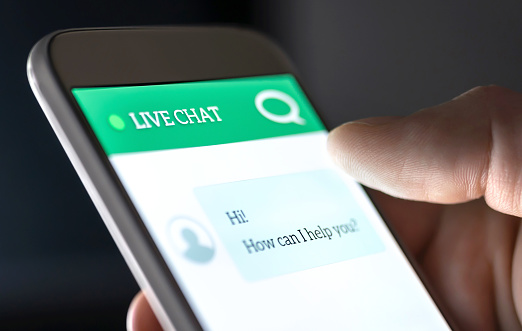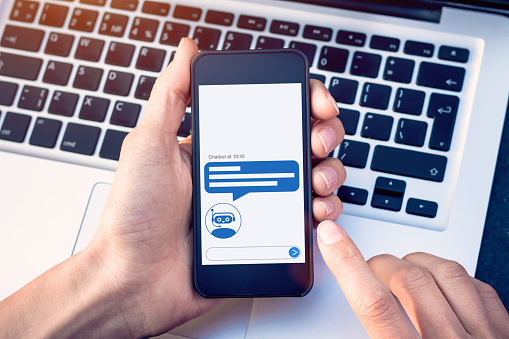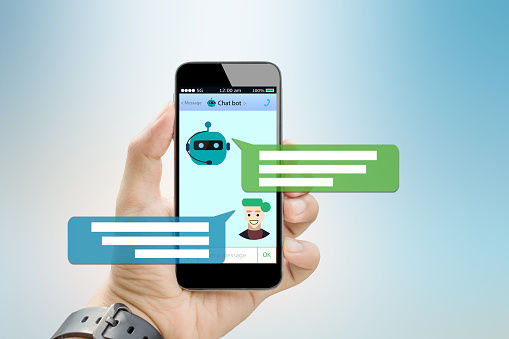Leverage the using chatbots for marketing your business

Using chatbots for marketing your business is a growing trend in the digital ecosystem*. That is, they are considered the next step in the evolution of the Internet after Web 2.0. It is an option to give greater prominence to the user with the rise of applications in the sale of smartphones.
But let’s define what chatbots are and what they are for. They are “programs that mimic the conversation with people through artificial intelligence.” In other words, they are a tool used by companies to:
- Streamline processes
- Prevent the existence of frustrated users who act against a brand.
- Serve as a mediator so that customers do not stop hiring their services or buying their products.
In this order of ideas, many sectors are making incursions into using chatbots for marketing by integrating them into different platforms as a value-added service. For example, hotel customers can make reservations directly and access personalized recommendations for their destinations. They can also contact the Customer Engagement Center through the company’s social networks.
However, the adaptation of these conversational models is growing in many sectors. For instance, banking, insurance companies, and other areas with extensive virtual call centers for customer service. These use systems that take care of:
- Directly answer questions
- Enable transactions and payments
- Provide immediate information on accounts, balances, or transactions, among others.
Let’s explore a little more the advantages of using chatbots for marketing your brand. Also, let’s look at how they can leverage to increase sales and improve your business reputation.
Using chatbots for marketing provides
your customers with a tailored experience

Using chatbots for marketing isn’t just limited to helping with customer service inquiries. They can also be part of your sales initiatives and connect with your audience. For example, it helps your customers have an interaction with someone who knows them by name. In addition, this type of conversation can take brand-user interaction to new levels by collecting data on who they interact with.
Likewise, using chatbots for marketing facilitates accurate responses to customer queries. They also take conversations a step further by offering your customers:
- Personalized shopping tips.
- Offering tips based on their purchase history and preferences
- Technical support accompaniment
- Presenting a step-by-step procedure for a particular service.
On the other hand, you can find the chatbots into three blocks such as:
- Increasing sales. Guiding the conversation so that users select, search and buy the products and services they need.
- Improve the customer experience. It is simple: answering their questions and complaints quickly and expediting the steps they need.
- Create content. It is enough to issue periodic updates, alerts, or send personalized messages based on the conversation previously held in the chatbot.
So, a business should think of an alternative way to optimize using chatbots for marketing based on the human loop. That is to say, human and collaborative factors should be present to fill in the gaps of an automatic response through the intervention of someone specialized. As a result, the chatbot can record that experience. Besides, apply it in future similar situations and adopt it in its conversation protocols.
Advantages of chatbots

Chatbots correspond to a technology that allows users* to have a conversation through software integrated into messaging systems, such as Facebook Messenger, Twitter, Telegram, or Whatsapp. Likewise, this system allows interaction with customers to answer their questions without the need for a person to answer. The most obvious advantage of using chatbots for marketing is that they are always available to solve the doubts of those who want to contact a brand at any time of the day.
Even though chatbots are an automatic interaction tool, keep in mind that their objective is to guide your customers towards a desired action or conversion. The algorithms designed for the use of chatbots enable them:
- Be able to learn
- Intuit the habits of the audience
- Understand the tastes and preferences of your users.
Using chatbots for marketing is basically for businesses whose mission is customer satisfaction. For example, Facebook’s experience reveals the following figures related to leveraging chatbots:
- Message exchanges are on the order of two billion between users and brands.
- 56% of regular and potential customers prefer to send messages via chatbot than call customer service directly.
- Almost 53% of Internet users make purchases from businesses that use chatbot facilities.
Chatbots have gained unusual strength. Just look at the data revealed by Google Trends on searches about chatbots. As a result, in the last five years, the search on this tool increased 19 times. That is why Internet users and companies began to realize its importance.
What else can we expect from chatbots?
Regarding using chatbots for marketing, we can only venture to say that they have not yet reached their full potential. That is to say, the projections made by IT experts point to a greater frequency of their use, moreover, mediated by the importance of how brands and consumers interact online.
Progress in the implementation of chatbots will allow, in corporate terms, that these become more valuable for both users and businesses. They will also be a decisive factor in increasing the good reputation of companies. For example, it is an estimation that 41% of customers who buy online trust the brand more when they use chatbots. So, with these projections, it only remains to affirm that using chatbots for marketing consolidates a high degree of satisfaction on many consumers.
To read this same article in Spanish, click here.
Links in Spanish*

